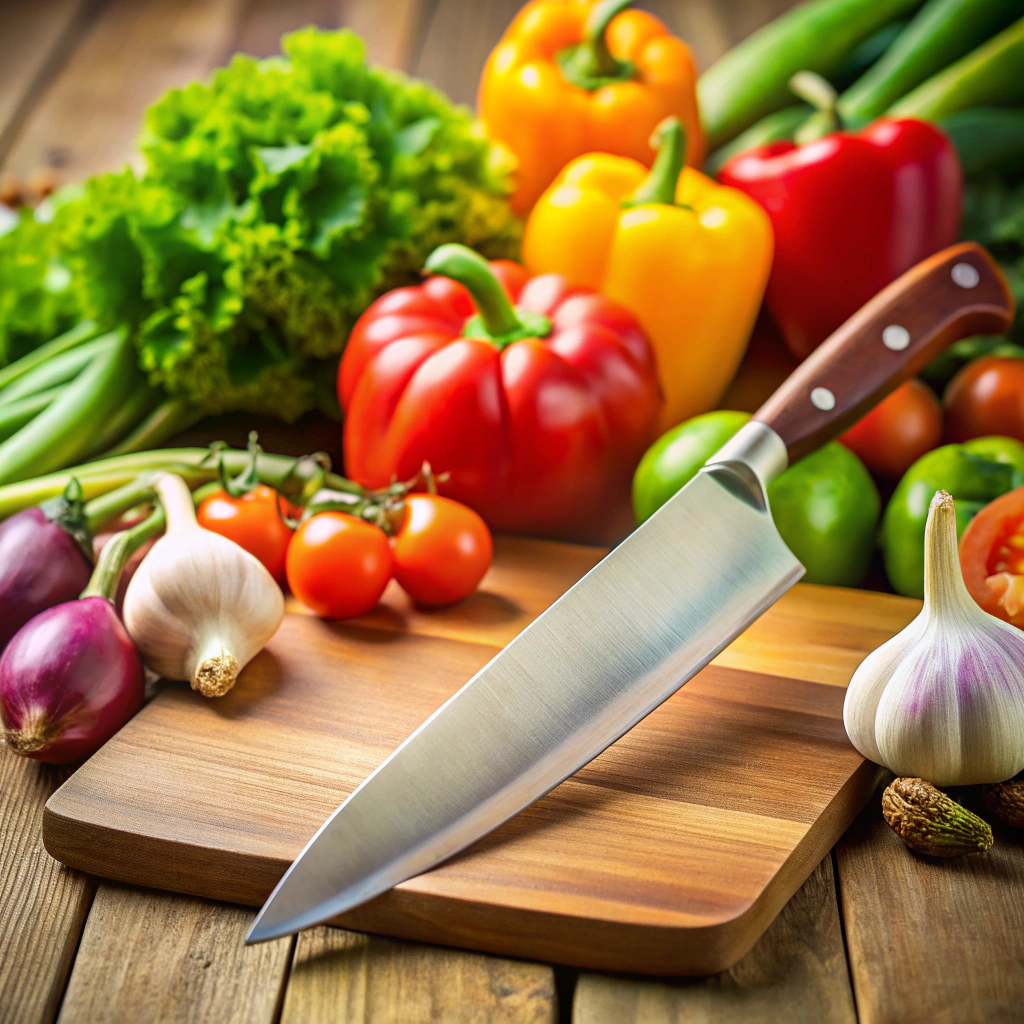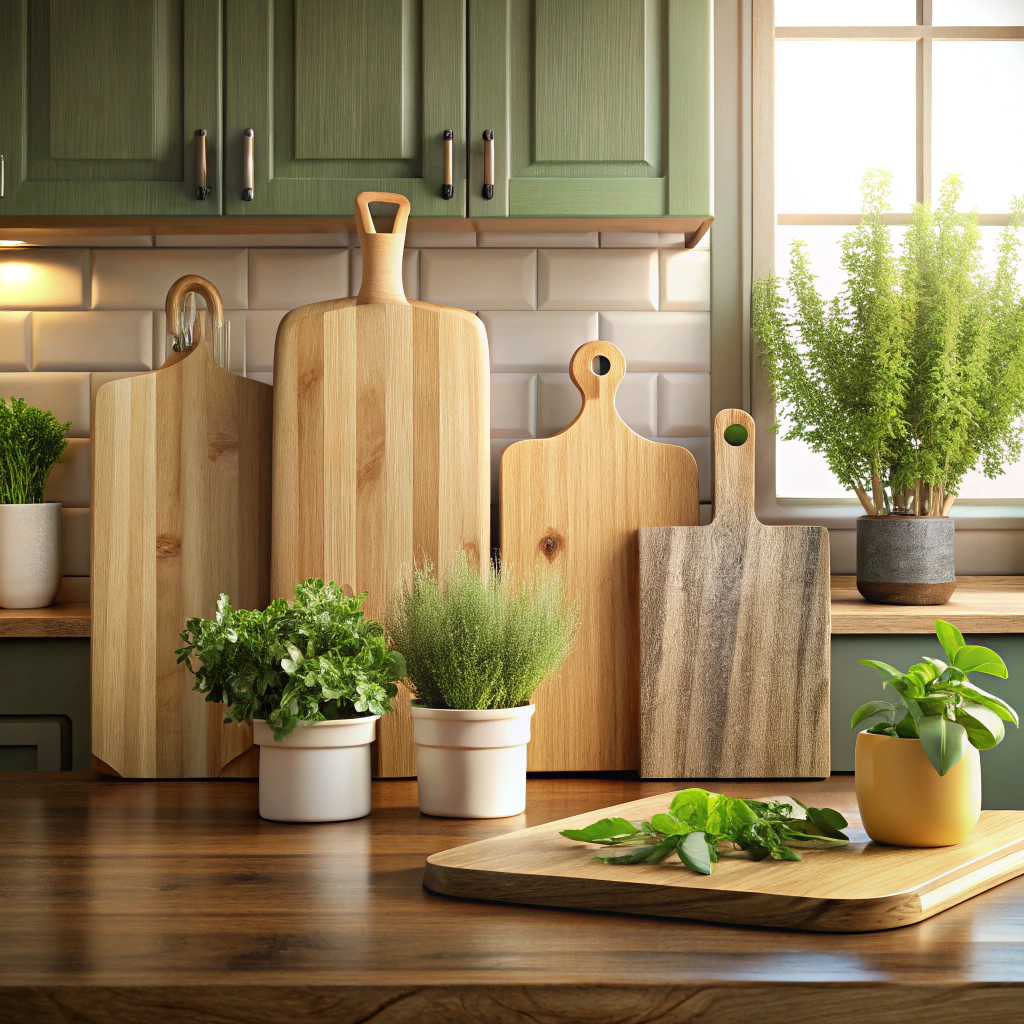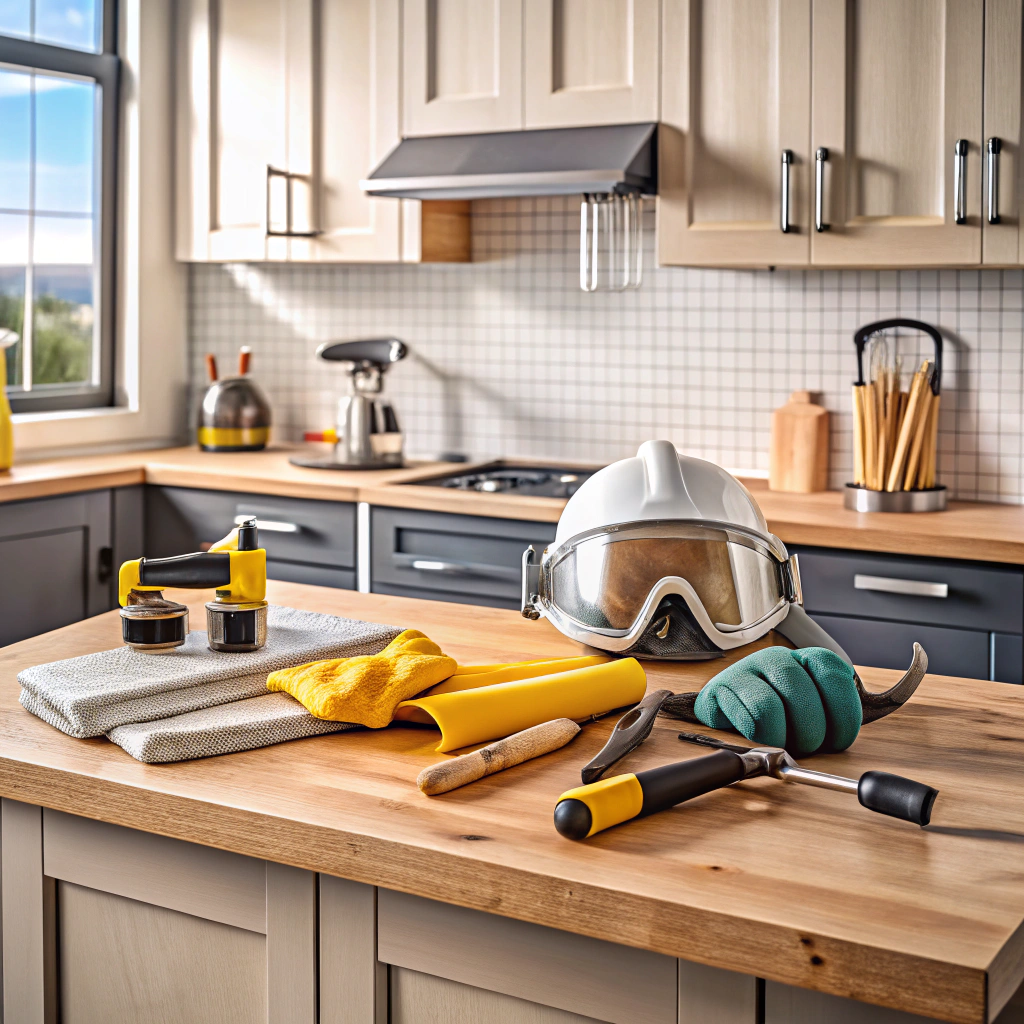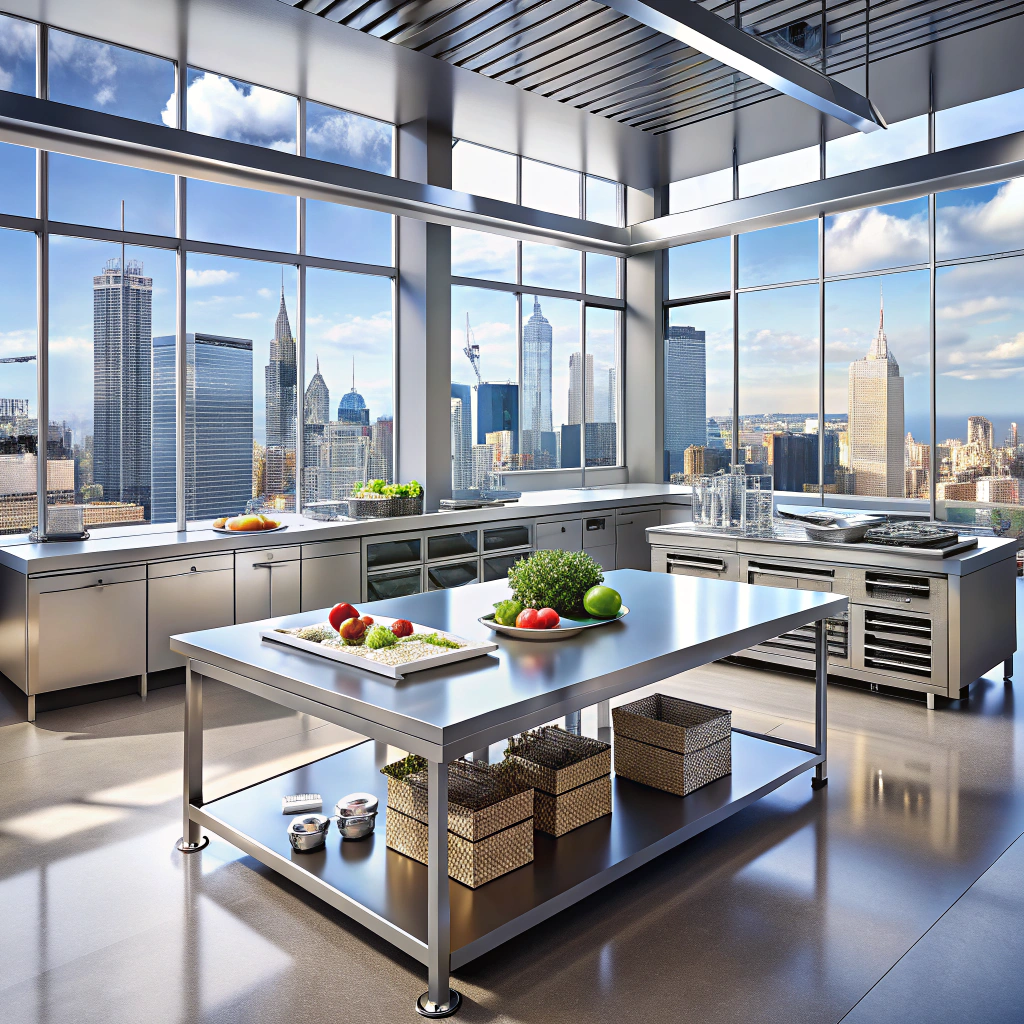Last updated on
Find out which flooring options will make your kitchen both stunning and practical.
Key takeaways:
- Hardwood floors are elegant and durable, but high-maintenance.
- Kitchen floor tiles, such as ceramic and porcelain, are durable and offer design flexibility.
- Luxury vinyl plank flooring is durable, water-resistant, and budget-friendly.
- Consider the durability of the flooring material based on your kitchen’s needs.
- Water resistance is important in the kitchen, choose materials like tile or vinyl plank.
What's Inside
Hardwood Kitchen Flooring
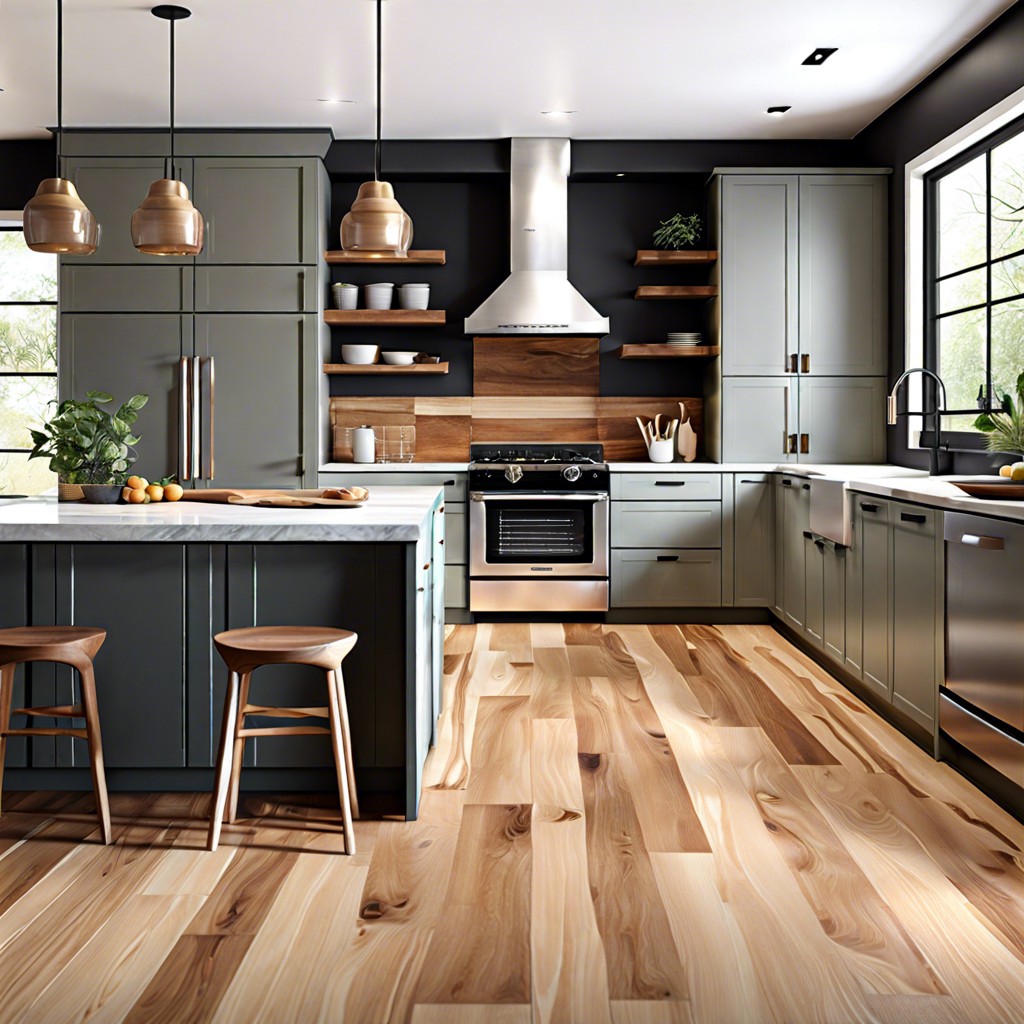
Elegant and timeless, hardwood floors can transform your kitchen into a warm and inviting space. They come in a multitude of finishes, from rustic oak to sleek cherry, giving you endless aesthetic options.
One of the biggest perks of hardwood is its durability. If maintained properly, it can last decades—though you might have to refinish it every few years to maintain its luster. Plus, scratches and dings can add character, or so you can tell yourself when you drop that cast iron skillet.
On the downside, hardwood isn’t the best friend of moisture. Spills need to be wiped up promptly to prevent warping, making it a bit high-maintenance. If you’re aiming for an open-concept look, hardwood seamlessly connects kitchen to living areas.
In short, it’s a classic choice, though maybe not the ideal one if your kitchen sees a lot of chaotic cooking action or water fights.
Kitchen Floor Tiles
Ceramic, porcelain, and even the occasional stone tile can all make your kitchen feel like a page out of a magazine. They’re highly durable and resist most spills and stains, which is a blessing during one of those chaotic dinner preps.
- Ceramic tiles are the classic go-to. Affordable, and available in any color under the sun.
- Porcelain tiles are the heavy-duty heroes. Denser and less porous, they’re tougher in high-traffic areas.
- Stone tiles add a touch of luxury. Think marble, granite, or slate. Each piece is unique, making your kitchen truly one-of-a-kind.
Tiles provide flexibility design-wise—arrange them in herringbone, subway, checkerboard, or any pattern that tickles your fancy. And the maintenance? Just a little sweeping, mopping, and the odd bit of grout cleaning.
Tread with care, though. Cold mornings may require an extra pair of socks, as tiles can be chilly. And oops—don’t drop any heavy pots; tiles aren’t too forgiving with chips or cracks.
Luxury Vinyl Plank Kitchen Flooring
This option is like the superhero of kitchen flooring. It’s incredibly durable, so it can handle all the dropped pots, spilled pasta, and those dance parties you have while waiting for water to boil.
Plus, it mimics the look of real wood or stone without the hefty price tag.
Another bonus? It’s softer underfoot, making those long cooking sessions easier on your legs.
Accidentally spill a cup of water? No need to panic; it’s water-resistant. Maintenance is a breeze – just a quick sweep or mop, and you’re good to go.
Also, it’s a delight for DIY enthusiasts since it’s fairly easy to install. Fancy some weekend project? Here you go.
Durability
Durability matters in a kitchen where spills, drops, and heavy foot traffic are the norms. Some floors are just tougher. Hardwood stands up well to wear but can scratch and dent—wear those socks, folks. Ceramic tiles resist scratches and dropped pots like champions but occasionally chip. Luxury vinyl, though, is practically indestructible. It’s the superhero of kitchen floors, combatting drops, water, and even pet claws without flinching.
In your kitchen, consider how much abuse the floor will take. Got kids? Pets? A penchant for dropping things? Then opt for sturdy materials. Ceramic and porcelain tiles will withstand decades of use. Hardwood, while beautiful, needs a bit more TLC. And luxury vinyl? It’s ready for your clumsiest days and wildest dinner parties.
Water Resistance
Water spills in the kitchen? More common than finding a sock with no match. That’s why water resistance is a game-changer for kitchen flooring. Tile and vinyl plank are the champions here.
Tiles, especially porcelain, laugh in the face of water. They’re dense and won’t let spills seep through. Bonus: easy to clean.
Luxury vinyl plank is your next best friend. It mimics hardwood but shrugs off water like a duck. Perfect for those who want style without the flood risk.
Hardwood can be tricky. It looks fabulous but needs a little extra love. Seal it properly and clean spills quickly.
Go for materials with waterproof or water-resistant features. You’ll thank yourself during the next spaghetti sauce fiasco.
Budget
Alright, let’s talk money. Kitchen flooring can range from “I need a second mortgage” to “Hey, I found a twenty in my jeans!”
Consider these points:
- Hardwood is often the priciest. Be prepared to shell out big bucks, especially for high-end options.
- Tile can vary. Porcelain is usually more expensive than ceramic, but they’re both generally cheaper than hardwood.
- Luxury Vinyl Plank (LVP) is budget-friendly, offering good looks without robbing your wallet. It’s the IKEA of flooring.
Think about long-term value too. Sometimes spending more upfront saves cash on repairs later.
DIY Vs. Professional Flooring Installation
Thinking of rolling up your sleeves and doing it yourself? Go for it! But first, let’s chat about the differences and what to consider.
- Skill Level:
- DIY flooring can save you a bundle but think twice if you’re a newbie. Cutting tiles isn’t as easy as slicing a cake. Mess up a measurement with hardwood, and suddenly you’ve got costly firewood.
- Time:
- Got a free weekend? That’s cute. Some flooring jobs can take weeks if you’re not experienced. Professionals can blitz through the task quicker than you can say “luxury vinyl plank.”
- Tools:
- Do you have all the tools? A tile saw, adhesive spreader, knee pads for those long hours on the floor? No? Be prepared to either invest in tools or find a way around it.
- Finish Quality:
- Pros nail the fine details, from perfecting edges to ensuring no awkward gaps. Want your flooring to look like a Pinterest board come to life? A pro might be worth the investment.
- Flexibility:
- DIY allows you to work on your own schedule. No waiting for an appointment. No opening your home to strangers. You can dance around in your PJs while you work.
- Warranty:
- Professional installers often provide warranties for their work. That’s like getting extra insurance for your peace of mind.
Whether you’re a brave DIY warrior or prefer leaving it to seasoned pros, each has its perks and pitfalls. Choose what works best for your skills and sanity!

